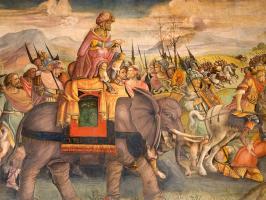Hannibal (review)

by Thomas Harris
The Plot
In this novel, Thomas Harris once again takes us deep into the mind of a dark criminal.
Seven years have passed since Dr. Hannibal Lecter escaped, seven years since FBI Special Agent Clarice Starling encountered him at the Baltimore State Hospital for the Criminally Insane. Dr. Lecter is still free, free to indulge in his well-known interests. But Starling has never forgotten their meetings, nor the metallic voice of Lecter, which she still remembers all too well.
Mason Verger, Lecter’s sixth victim, has also not forgotten. For too many years, he has lived attached to a machine that helps him breathe, isolated in his room from where he rules his vast commercial empire and takes pleasure in terrifying helpless children. Completely consumed by the desire for revenge, he constantly follows any possible lead, any single clue, by any means necessary.
He soon realizes that to catch Lecter, he must offer the most refined and innocent bait: the one thing Lecter craves above all else.
The doctor has not changed; he continues to kill, following his terrifying yet refined selection method, spreading fear among people who do not recognize him.
During an operation, Starling kills a notorious fugitive holding a baby in a carrier on her chest, which leads to her temporary suspension from duty. At that time, Lecter sends Clarice a letter, restarting the infamous hunt for Hannibal.
A series of events unfold in a whirlwind of twists and revelations: Chief Inspector Rinaldo Pazzi of the Florence Police Department is hanged for attempting to sell Lecter to Mason Verger.
Muskrat Farm becomes the main stage where most of the events occur and where the scene of Dr. Hannibal Lecter’s death is set...
Powerful and hypnotic, Hannibal is a splendid feast for the imagination. It is a journey to hell and beyond, led by a great storyteller who continually shifts the boundaries of a world we thought we knew.
There is a multitude of characters involved in the story, but three stand out as the true protagonists: former psychiatrist Dr. Hannibal Lecter, FBI Special Agent Clarice Starling, and the wealthy Mason Verger.
Mason Verger is depicted as having been paralyzed for a long time. His face lacks soft tissue: "it's just teeth, like a creature from the depths of the ocean," Starling thinks the first time she speaks with him (p. 59). He has no nose or lips, which makes it impossible for him to pronounce labial consonants. He is not blind; he has one blue eye without an eyelid, protected by a monocle that keeps it moist. His blood vessels throb over his bones, appearing like veins swallowing something; his hair is the only part of him that is not frightening: black streaked with gray and tied into a long braid. His voice is resonant and mechanically amplified. His character is highly driven by revenge, but he is also deeply religious. In fact, he plans to make Dr. Lecter suffer by having him eaten by pigs but believes that God is on his side.
Clarice Starling is the person who knows Lecter best; she has been investigating him ever since they first met seven years earlier at the Baltimore State Hospital for the Criminally Insane. Clarice is aware that Dr. Lecter will not kill her because a bond has developed between them.
Starling is deeply devoted to the FBI, but it is this very institution that will betray her. Her only comfort will come from her roommate, Ardelia Mapp, who is also an FBI agent, and her superior, Jack Crawford.
Dr. Hannibal Lecter is a former psychiatrist who escaped from the Baltimore State Hospital for the Criminally Insane seven years before the beginning of the book. His most frequently mentioned physical features include his red-tinged eyes, which instill terror in anyone who talks to him, and his slender silhouette. Dr. Lecter is a cannibal, but not like others; he kills (and eats) only those who have wronged him, underestimated him, or failed to show him the respect he deserves. For this reason, he has no intention of killing Starling, who has always treated him with respect. On the contrary, he kills Paul Krendler (another superior of Starling) because he does not show respect for either Clarice or the doctor.
Dr. Lecter shares with Clarice a love for fine cars and good food; one of his habits is to give women a bottle of exquisite wine bottled on the day of their birth, and he gifts one to Starling as well.
As a child, Hannibal suffered a significant trauma: his sister Mischa was eaten by a group of hunters who had previously dragged a deer with a noose to their camp; this event is frequently recalled throughout the story. Additionally, Dr. Lecter often wishes that Starling were Mischa.
When Thomas Harris wrote this thriller, he used language that is not overly complex but still not elementary. Some events are explained using fairly complicated terms, making comprehension a bit challenging. “This book is a work of fiction. Names, characters, places, and events are either products of the author's imagination or used fictitiously. Any resemblance to actual events or people, living or dead, is purely coincidental,” the publisher explains before the story begins, so anyone reading the book need not worry.
What struck me most about the book (having also seen the movie) is the greater wealth of details and events. The ending, in particular, is opposite to that of the movie, but there are other differences as well. For instance, Mischa is not present in the film, and the scene involving the death of a certain character is very different (chap. 88 pp. 408-411). The book also has much stronger expressive power than the film.
I really enjoyed this book because it is highly engaging and full of twists. Therefore, I recommend it to everyone, even though it contains very graphic scenes and is quite expensive; nevertheless, Hannibal by Thomas Harris is truly an excellent book.























